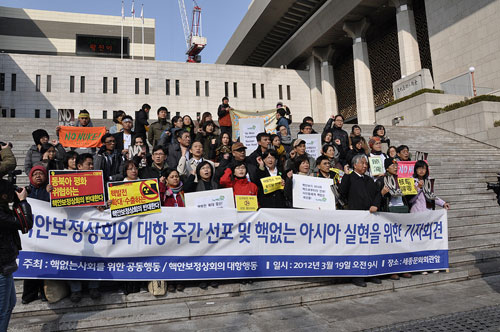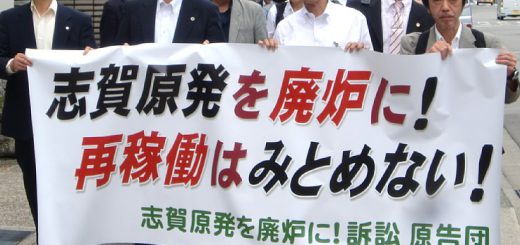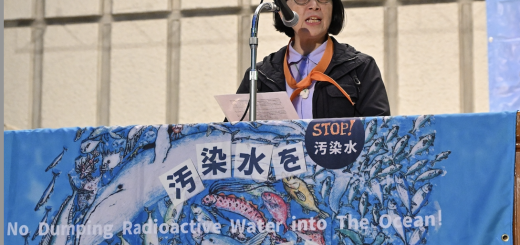15th No Nukes Asia Forum in South Korea Nuke Info Tokyo No. 148
“No Nukes”: Residents speak out in Samcheok and Yeongdeok, proposed sites for new nuclear power plants
 |
|
Photo by A. Kobayashi
|
Since the Fukushima nuclear accidents, there have been moves around the world to reconsider nuclear energy policies, but, as always, there are also counter moves which ignore the fervent cries of the people. In March several pro-nuclear conferences were held in South Korea in quick succession. The Pacific Basin Nuclear Conference was held in Busan from March 18 to 23, the Nuclear Industry Summit was held in Seoul on March 23, and the Nuclear Security Summit was held on March 26 and 27. It was in this context that Energy Justice Actions and other South Korean NGOs organized the 15th No Nukes Asia Forum (NNAF) from March 19 to 24. A total of 42 people attended the forum, 32 of these from Indonesia, the Philippines, Thailand, Taiwan and Japan.
Due to the Nuclear Security Summit, the atmosphere at the airport was very tense. Without giving any reason, the South Korean Government refused entry to one of the Japanese NNAF participants. On the morning of March 19 a press conference was held in front of the Sejong Center to protest the denial of entry to Shin Kurumizawa from Osaka and the deception of the Nuclear Security Summit.
After that we attended an assembly of Catholic priests in Samcheok, Gangwon-do. Along with Yeongdeok in Gyeongsangbuk-do, Samcheok was selected last December by Korea Hydro & Nuclear Power as the site of a new nuclear power plant. There were banners everywhere saying “No Nukes!”
One of the participants was Kenichi Hasegawa, a dairy farmer from Iitate Village in Fukushima Prefecture. He told how after the accident he was forced to destroy all his cows and how the eight members of his family were scattered. He said, “The mountains and farmland of my home town were contaminated with radioactivity. I want Fukushima to be the last place where people have to go through this kind of experience.” At a demonstration of about 1,500 people we chanted “Absolutely no nukes!” and “Recall the mayor,” while onlookers joined in the chanting.
At the meeting in the evening, Mr. Hasegawa showed photos. “Iitate was a place where everyone cooperated to make the village beautiful. After the accident we had to escape, leaving behind our cows, who were like family to us.” There were sighs from the audience as we heard stories of women saying goodbye to their cows which were being led off to the slaughter, of a suicide note from a despairing friend, and of cows dying of starvation.
Emily Dela Cruz from the Philippines gave a report on how in 1986 they prevented operation of the Bataan Nuclear Power Plant, which was built in 1984. Behind their success was a persistent movement from the mid 1970s along with citizens’ education. The civil society movement reached its peak at the end of the Marcos era in the mid 1980s. I was moved once again to hear how a strong people’s movement was able to prevent a nuclear power plant from being started up. I am sure it gave courage to the people of Samcheok.
 |
|
Nuclear Facilities in South Korea
|
The following day, after a tour of the proposed site of the Samcheok nuclear power plant we went to Yeongdeok. Lee Byeong-hwan, the leader of the Stop Yeongdeok Nuclear Power Plant Committee expressed his opposition, saying, “The proposed site is in a region of active faults. The nuclear power plant will destroy the marine ecology.” Yeongdeok has on three occasions repelled nuclear-related facilities, including a radioactive waste dump.
At the forum Setsuko Kuroda from Koriyama City in Fukushima Prefecture explained the painful situation that the people of Fukushima find themselves in. Lai Fenlan from Taiwan’s Green Party said, “Taiwan’s anti-nuclear movement developed in close association with the fight for democracy. We learned from the renewable energy policies of Germany and grew the movement in solidarity with Green Parties throughout the world.” Pan Han-Shen, who was a Green Party candidate, said, “Our national support rate is not that high, but on Orchid Island, the site of a radioactive waste dump, our support rate is 36%, making us the second strongest party.” After that, Lin Shih-Lan, an indigenous person from Orchid Island, gave a report about the staggering situation on the island. “At first we were told that a canned fish factory would be built. At the disposal site people don’t wear any protective clothing. The windows are left wide open, so radioactive materials and radiation are released to the outside. This is happening because there is no strict regulation of operations.” He also said, “70% of the workers at the disposal site are indigenous people. There is a big pay difference between the indigenous people and the other workers,” indicating that indigenous people are discriminated against in terms of wages
On March 21 in Busan we carried out a protest action against the Pacific Basin Nuclear Conference. At a meeting about the Fukushima nuclear accident I reported on the situation of workers at the Fukushima Daiichi Nuclear Power Plant. Setsuko Kuroda and Saeko Uno, an evacuee from Fukushima, reported on the difficult conditions of the disaster victims.
On March 22 we participated in an international meeting at Sogang University in Seoul. The meeting was held in opposition to the Nuclear Security Summit and several NNAF participants gave presentations.
On March 23, on the way to a press conference opposing the Nuclear Industry Summit, hoards of police blocked the subway station passageways. We quickly unfurled our placards and chanted “No more Fukushimas! No more Fukushimas! No more nuclear energy in Asia!” Mass media cameras flashed, lighting up the protesters, who did not budge in spite of harassment from the police. Our subway press conference was a great success. In the afternoon, NNAF participants released a joint statement and decided that the next NNAF meeting would be held in Indonesia.
It was the first time for me to participate in NNAF. It was a very moving experience and a tremendous inspiration for me to take action and exchange opinions with the participants, who came from many countries. I hope to make the most of the experience in my future activities. I also hope that as friends united by a common goal, we can continue to deepen our solidarity.
(Mikiko Watanabe, CNIC)


